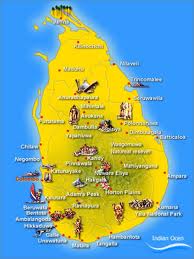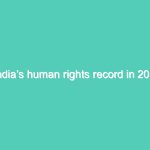 While the West, UN, Tamil Diaspora and the Human Rights community throughout the world have been trying to book Sri Lanka on the human rights violation during the last days of Eelam War IV, the island nation on its part is holding an international conference on “Defeating Terrorism: the Sri Lankan Experience”. This conference is financially supported by two Chinese firms Chinese Poly Technologies and China Electrical and Technologies Corporation. This conference is attended by military personnel from over 42 countries. It is still not sure why Sri Lanka conducted this conference, when the international community has voiced for UN investigation on the war crimes and Sri Lanka is yet to adhere to its promise of appointing a credible and independent commission to investigate the war crimes committed during Eelam War IV.
While the West, UN, Tamil Diaspora and the Human Rights community throughout the world have been trying to book Sri Lanka on the human rights violation during the last days of Eelam War IV, the island nation on its part is holding an international conference on “Defeating Terrorism: the Sri Lankan Experience”. This conference is financially supported by two Chinese firms Chinese Poly Technologies and China Electrical and Technologies Corporation. This conference is attended by military personnel from over 42 countries. It is still not sure why Sri Lanka conducted this conference, when the international community has voiced for UN investigation on the war crimes and Sri Lanka is yet to adhere to its promise of appointing a credible and independent commission to investigate the war crimes committed during Eelam War IV.
The underlining factor is in this conference is the financial support provided by China for such an expensive grandeur. Adding, the participation from so many counties also cautions that Sri Lanka cannot be taken lightly on its military victory against the LTTE. Will this grandeur change or challenge international ramifications on the human rights violations? What is more, Sri Lanka in the 17th session of the UN Human Rights Commission has garnered support from countries like China, Pakistan, Iran, etc against any move to have international mechanism to investigate war crimes in Sri Lanka.
Two articles in this regard need special mention. First, the Global Context of Counterterrorism: Strategy, Ethics, and Sustainability in Sri Lanka’s COIN Experience, speech by Dr. David Kilcullen at the seminar on ‘Defeating Terrorism: The Sri Lankan Experience’, and second; the series of articles on Winning the War – Sri Lankan Experience by General GSC Fonseka. Links for both these articles are available in the news update given below.
Both these articles explore vital issues on the conduct of war during the last days of Eelam War IV. While the first article praises the achievements of the armed forces it also emphasizes the need for addressing the human rights violations. Criticising the killings of the LTTE cadres who had walked with raised white flags, the speech mentions that these actions reduced the space for reconciliation and surrender in Sri Lanka. While most of speeches at the seminar were self congratulatory, there were some deviations from these practices. Dr. David Kilcullen’s speech is an example of deviation.
The series of articles by General Fonseka, that were published in Sri Lanka Guardian raises numerous questions on the conduct of war. Although these articles were meant to sing rhetoric of the achievements of General Fonseka’s in the Eelam War IV, use of defamatory statements on the political leadership does not gel-well with the reality. It well known that Rajapakse’s non-interfering leadership and withstanding of international pressure were important contributors to the defeat of the LTTE. However, as mentioned indirectly by Dr. David Kilcullen in his speech that having provided a good leadership, President Rajapakse is equally responsible for the war crimes committed during the last days of war. An important aspect in Fonseka’s article is his statistics on the number of deaths during the war. According to his calculation around 23,000 LTTE cadres were killed by Army, 200 killed by Navy, 1500 killed by Air force, 50 killed by police and 20 killed by Civil defence force. The captured list includes 12000, by army, 10 by Navy and 10 by police. During the heights of war, most strategic scholars pointed out that LTTE had a strength of around 14,000 to 15,000 cadres were fighting in the war. If one were to analyse these numbers with earlier calculations, its intriguing to how did General Fonseka come to a conclusion that around 24,720 LTTE cadres were killed in the war plus another 12,000 surrendered. Also how were they able to distinguish cadres from civilians? Ether ways, the government’s claim of zero civilian deaths seem to be far from truth.


